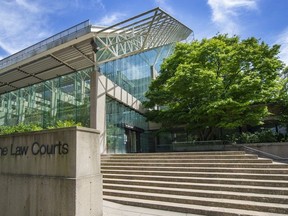Judge found the driver guilty of possession for the purpose of trafficking for 211 g of cocaine that was found in a co-accused’s backpack who was a passenger at the time

A Vancouver taxi driver who used his cab to make drug deliveries for a dial-a-dope operation run by others was found guilty of a drug-trafficking charge in B.C. Supreme Court.
Recommended Videos
The driver, referred to as MD Rafiqul Islam in court documents, was found guilty of possession of drugs for the purpose of trafficking after Vancouver police arrested him on June 24, 2021, after he had picked up one of his two co-accused in the Vancouver Taxi he co-owns.
Acting on a tip from an informant that a taxi driver was delivering drugs around Metro Vancouver, police surveilled the cab for about two weeks before the arrest, Justice Heather MacNaughton said in a judgment released Tuesday.
The co-accused had 211 grams of cocaine in his backpack when he and Islam were arrested and MacNaughton agreed with the prosecution position that Islam knew that the co-accused was delivering drugs or was wilfully blind to it.
Islam testified at his November trial the two co-accused were just regular customers and he had no knowledge of what they had in their knapsacks or that the two downtown Vancouver condo suites he frequently drove them to or from were drug stash houses.
To find Islam guilty of possession for the purpose of trafficking, prosecutors had to prove he was in possession of the controlled substance, the substance was cocaine, he knew it was a controlled substance and he had possession of the cocaine for the purpose of trafficking, MacNaughton wrote.
She found, based on security camera footage from inside the cab and police surveillance notes, that quick exchanges between the co-accused and people outside the cab lasting five seconds and less than two minutes in two instances proved Islam had to have known of the drug deals.
“Although he may not have known the exact nature of the drugs in (the co-accused’s) backpack, I find that he knew that (he) was carrying an illicit substance for the purpose of trafficking,” concluded MacNaughton.
“Mr. Islam exercised control over the cocaine, in the sense of being the driver of the taxi used to transport the cocaine, as part of a dial-a-dope drug trafficking operation in which he was an active participant,” she wrote.
In a series of texts, he frequently refers to the two co-accused as “boss” and updates them frequently on his location. And in one, he is instructed by a co-accused to not to “leave the car without your phone for f—k’s sake man,” according to the judgment.
MacNaughton noted he didn’t send such frequent texts to other repeat customers and their texts demonstrated a “level of control or a hierarchical relationship between Islam and these two men.”
The two stash houses were searched on the day of Islam’s arrest and police found 627 grams of fentanyl, 766 grams of cocaine, about 1.5 kilograms of cutting agent and one kilogram of caffeine along with drug-dealing paraphernalia such as plastic bags, a blender, scale and money counters in the suite at Howe and Drake streets. And more than 12 kilograms of fentanyl and fentanyl mixtures, almost four kilograms of cocaine, cutting agents, other drug paraphernalia, as well as over $323,000 in Canadian bills and money counters in the Hornby Street suite, according to the judgment.
During his arrest, police found $300 in Islam’s shirt pocket and $1,390 in his wallet, MacNaughton wrote.
In the co-accused’s backpack, there were vacuum-sealed plastic bags with various amounts of cocaine adding up to 211 grams, each labelled with different first names, including Terry, Doll, Ace and Chris, and almost $750 in cash, she wrote.
Islam’s co-accused were previously convicted and have been or are awaiting sentencing, according to court records.